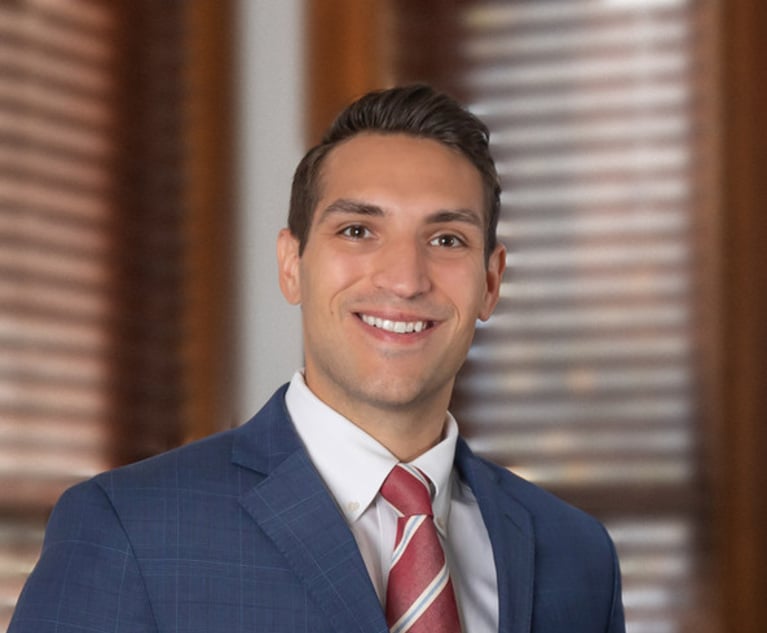 Norwalk City Hall. Photo: Google
Norwalk City Hall. Photo: GoogleFederal Judge Rules Against Norwalk's Request to Dismiss Suit Seeking Halfway House in Community
Pennsylvania-based Firetree Ltd. scored a court victory Friday when a federal judge ruled the city of Norwalk couldn't dismiss its lawsuit seeking to build a halfway house on the south side. As of Friday afternoon, the city had not responded.
September 14, 2018 at 04:23 PM
4 minute read
A federal judge in Connecticut has denied the city of Norwalk's request to dismiss a lawsuit filed by a Pennsylvania-based company to create a halfway house in the city for individuals referred by the Federal Bureau of Prisons.
Firetree Ltd., which operates halfway houses in Pennsylvania and New York, claimed the city's denial of certain permits was discriminatory against the disabled. The company also said the city bent to political and neighborhood pressures. The house in question is located on Quintard Avenue in the city's South Norwalk neighborhood.
In his Friday morning ruling, U.S. District Judge Michael Shea of the District of Connecticut struck down virtually every claim the city brought forward in its effort to dismiss the lawsuit.
Shea wrote: “The defendants assert that Firetree's housing claims fail because the residents of the proposed halfway house are prison inmates and such inmates have no right to the housing of their choice. This misses the point. Firetree is not arguing that the defendants wrongfully denied it the ability to use the property as a halfway house because of a discriminatory animus against prisoners. It is contending that the defendants discriminated against it because the residents of its halfway houses are disabled.”
Shea also wrote: “None of the defendant's arguments merit forcing Firetree to seek relief elsewhere after litigating this case for nearly two years.”
The state has yet to respond to the judge's ruling.
In its lawsuit, Firetree alleges several violations, including violation of the federal Americans with Disabilities Act and violation of due process. With regard to the alleged violation of the ADA, the lawsuit states the “vast majority of individuals who reside at Firetree's halfway houses are diagnosed by the BOP [Bureau of Prisons] as disabled with either addiction recovery disabilities, mental health disabilities, or physical disabilities.”
The property in question has been used as a drug and alcohol rehabilitation facility by Pivot Ministries since 1976. In early 2014, Pivot contacted Firetree, according to the complaint, to see if the company would be willing to purchase the property to be used as a halfway house. Firetree ended up buying the property in 2015 for $429,000. Initially, Firetree received building permits from the town to build the facility.
Then, Firetree says, neighborhood and political opposition muddied the waters. Several neighbors, with the support of some local political leaders, rallied against the planned halfway house. “Bowing to this political pressure, the city denied the C.O. [certificate of occupancy]. … The city informed Firetree that it would have to submit a new application for the new operator of your facility.”
Various zoning meetings were held, none of which ended with approval of the permits needed to build the facility. One hearing in the summer of 2017, the complaint said, “was marred by procedural irregularities, discrimination, political pressure, and neighborhood opposition based on stereotypes about persons with disabilities.”
In its motion to dismiss the complaint, the city claimed Firetree “exploited its different definitional uses of the term halfway house. … The city of Norwalk zoning authorities discovered plaintiff's manipulation [of the term halfway house] and denied plaintiff's various zoning applications in conformance with the prescription of the building zone regulations.”
In a statement emailed to the Connecticut Law Tribune on Friday afternoon, Firetree vice president Amy Ertel wrote: “We are very pleased that the court denied the city of Norwalk's motion to dismiss our complaint. For over two years, Firetree has been denied its lawful right to open and operate a halfway house for disabled individuals at a property that has been used as a halfway house for more than 40 years. We did not want to litigate this case, but we had no choice given the city's egregiously discriminatory conduct. We look forward to putting forth the facts of this matter to the court, and to obtaining the full measure of relief due to Firetree under the law.”
In its statement, Firetree refers to the previous use of the property for drug rehabilitation as a halfway house.
Firetree is represented by Robinson & Cole attorneys Thomas Cody, Frank Coulom Jr. and Evan Seeman. The attorneys referred all comment to the company's statement.
The city of Norwalk is represented by Scott McKessy of Halloran & Sage and Brian McCann, Norwalk's corporation counsel. McKessy declined to comment Friday and McCann did not respond to a request for comment.
This content has been archived. It is available through our partners, LexisNexis® and Bloomberg Law.
To view this content, please continue to their sites.
Not a Lexis Subscriber?
Subscribe Now
Not a Bloomberg Law Subscriber?
Subscribe Now
NOT FOR REPRINT
© 2025 ALM Global, LLC, All Rights Reserved. Request academic re-use from www.copyright.com. All other uses, submit a request to [email protected]. For more information visit Asset & Logo Licensing.
You Might Like
View All
New York-Based Harris Beach Combines With Connecticut-Based Murtha Cullina, Forming NE Powerhouse
3 minute read
Conn. Supreme Court: Workers' Comp Insurance Cancellations Must Be Unambiguous
4 minute read
Trending Stories
- 1Restoring Trust in the Courts Starts in New York
- 2'Pull Back the Curtain': Ex-NFL Players Seek Discovery in Lawsuit Over League's Disability Plan
- 3Tensions Run High at Final Hearing Before Manhattan Congestion Pricing Takes Effect
- 4Improper Removal to Fed. Court Leads to $100K Bill for Blue Cross Blue Shield
- 5Michael Halpern, Beloved Key West Attorney, Dies at 72
Who Got The Work
Michael G. Bongiorno, Andrew Scott Dulberg and Elizabeth E. Driscoll from Wilmer Cutler Pickering Hale and Dorr have stepped in to represent Symbotic Inc., an A.I.-enabled technology platform that focuses on increasing supply chain efficiency, and other defendants in a pending shareholder derivative lawsuit. The case, filed Oct. 2 in Massachusetts District Court by the Brown Law Firm on behalf of Stephen Austen, accuses certain officers and directors of misleading investors in regard to Symbotic's potential for margin growth by failing to disclose that the company was not equipped to timely deploy its systems or manage expenses through project delays. The case, assigned to U.S. District Judge Nathaniel M. Gorton, is 1:24-cv-12522, Austen v. Cohen et al.
Who Got The Work
Edmund Polubinski and Marie Killmond of Davis Polk & Wardwell have entered appearances for data platform software development company MongoDB and other defendants in a pending shareholder derivative lawsuit. The action, filed Oct. 7 in New York Southern District Court by the Brown Law Firm, accuses the company's directors and/or officers of falsely expressing confidence in the company’s restructuring of its sales incentive plan and downplaying the severity of decreases in its upfront commitments. The case is 1:24-cv-07594, Roy v. Ittycheria et al.
Who Got The Work
Amy O. Bruchs and Kurt F. Ellison of Michael Best & Friedrich have entered appearances for Epic Systems Corp. in a pending employment discrimination lawsuit. The suit was filed Sept. 7 in Wisconsin Western District Court by Levine Eisberner LLC and Siri & Glimstad on behalf of a project manager who claims that he was wrongfully terminated after applying for a religious exemption to the defendant's COVID-19 vaccine mandate. The case, assigned to U.S. Magistrate Judge Anita Marie Boor, is 3:24-cv-00630, Secker, Nathan v. Epic Systems Corporation.
Who Got The Work
David X. Sullivan, Thomas J. Finn and Gregory A. Hall from McCarter & English have entered appearances for Sunrun Installation Services in a pending civil rights lawsuit. The complaint was filed Sept. 4 in Connecticut District Court by attorney Robert M. Berke on behalf of former employee George Edward Steins, who was arrested and charged with employing an unregistered home improvement salesperson. The complaint alleges that had Sunrun informed the Connecticut Department of Consumer Protection that the plaintiff's employment had ended in 2017 and that he no longer held Sunrun's home improvement contractor license, he would not have been hit with charges, which were dismissed in May 2024. The case, assigned to U.S. District Judge Jeffrey A. Meyer, is 3:24-cv-01423, Steins v. Sunrun, Inc. et al.
Who Got The Work
Greenberg Traurig shareholder Joshua L. Raskin has entered an appearance for boohoo.com UK Ltd. in a pending patent infringement lawsuit. The suit, filed Sept. 3 in Texas Eastern District Court by Rozier Hardt McDonough on behalf of Alto Dynamics, asserts five patents related to an online shopping platform. The case, assigned to U.S. District Judge Rodney Gilstrap, is 2:24-cv-00719, Alto Dynamics, LLC v. boohoo.com UK Limited.
Featured Firms
Law Offices of Gary Martin Hays & Associates, P.C.
(470) 294-1674
Law Offices of Mark E. Salomone
(857) 444-6468
Smith & Hassler
(713) 739-1250











